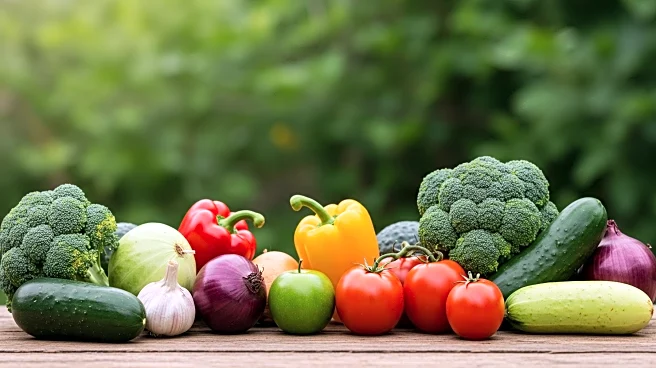What's Happening?
The Bureau of Labor Statistics has reported a significant increase in wholesale vegetable prices, contributing to a 3.3% rise in the producer price index for July compared to the previous year. The wholesale prices for fresh and dry vegetables surged by 38.9%, a notable spike that has drawn attention from economists. William Masters, a food economist at Tufts University, noted the volatility of vegetable prices, likening their fluctuations to a cardiac chart. Brown University political economist Mark Blyth suggested potential causes such as climate change and labor shortages due to President Trump's immigration policies. Additionally, David Ortega from Michigan State University pointed out that tariffs on imported vegetables, which constitute over a third of U.S. vegetable consumption, are higher than last year, affecting domestic prices.
Why It's Important?
The increase in wholesale vegetable prices is significant as it may lead to higher consumer prices, impacting household budgets. Grocery stores, operating on thin margins, may pass these cost increases onto consumers, potentially affecting food affordability. The situation highlights the interconnectedness of global trade policies, climate conditions, and domestic labor issues in shaping market dynamics. If prices continue to rise, it could lead to broader economic implications, including inflationary pressures and changes in consumer spending patterns. Stakeholders such as farmers, retailers, and policymakers must navigate these challenges to stabilize the market and ensure food security.
What's Next?
If wholesale prices remain elevated, consumers may see increased prices at grocery stores in the coming months. Economists and policymakers will likely monitor these trends closely to assess the need for interventions or adjustments in trade and labor policies. The agricultural sector may seek strategies to mitigate the impact of tariffs and labor shortages, potentially exploring automation or alternative sourcing. Additionally, discussions around climate change and its effects on agriculture may gain traction, prompting further research and policy considerations.
Beyond the Headlines
The spike in vegetable prices underscores broader issues such as the vulnerability of agricultural supply chains to external factors like climate change and immigration policies. It raises ethical questions about the treatment of labor in the agricultural sector and the sustainability of current trade practices. Long-term shifts may include increased investment in climate-resilient farming techniques and a reevaluation of trade agreements to balance domestic production with import reliance.










